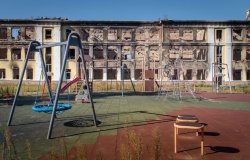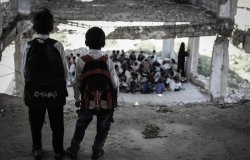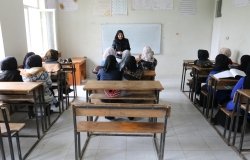Combating Extremism Through Education: Lessons from Pakistan and Across the Muslim World
A top education policy official in Pakistan discusses how his country--and the wider Muslim World--can fight radicalism through revitalized policies that increase access to science and technology education.
Overview
Last year, Pakistan suffered several hundred terrorist attacks and clashes between security forces and militants. Such figures, according to Javaid R. Laghari, illustrate the extent of extremism in the country. Laghari, speaking at an Asia Program event (co-sponsored by the Middle East Program) on the 11th anniversary of the September 11, 2001, attacks, argued that this extremism—and the mindset that produces it—is a consequence of Pakistan’s “dysfunctional educational system.” Millions of Pakistani children do not attend school. Those who are in school must deal with decrepit school buildings, limited supplies, outdated curricula, and poorly trained teachers.
Laghari identified several causes of Pakistan’s education crisis. One is meager expenditure. Islamabad allocates 2.3 percent of GDP to education—one of the lowest rates in the world, and not even half of the 5 percent allotment recommended by the United Nations. Another driver is Pakistan’s young and rapidly growing population. Half the Pakistani populace is under the age of 18, and two-thirds are under 30. Currently numbered at 180 million, the total population is projected to balloon to 350 million by 2040. Such large quantities of young people put tremendous pressure on Pakistani schools. A third contributor to Pakistan’s education woes is the country’s troubled economic situation. One-third of the population lives on less than a dollar a day, two-thirds subsist on less than two dollars a day, and less than 2 million Pakistanis pay taxes. Under such conditions, Laghari concluded, it is hard for the nation—both the government and families—to marshal the necessary resources to support education.
As a result, Pakistan faces a looming illiteracy crisis. Though nearly 60 percent of the nation is literate today, the number of literate Pakistanis is rising at an annual rate of only 1 percent. According to Laghari, this low rate, coupled with high population growth, means that the number of illiterate Pakistanis is growing—and he estimated that Pakistan will be the world’s largest illiterate nation by 2050. Another unsettling outcome of Pakistan’s education crisis is the “parallel system of education” provided by madrassas. Seven percent of school-going Pakistani children attend these religious institutions, stated Laghari, though given the high number of unregistered madrassas, the number is likely much higher. These schools, he said, have become a “breeding ground” for extremism.
The sad story of Pakistani education is mirrored elsewhere in the Muslim world. Throughout the region, “dictatorial leaders” have traditionally neglected the education sector. Consequently, there are currently only 450 researchers per million people in the Muslim world (compared to over 4,000 per million in the United States). Only two Nobel laureates hail from the Muslim world, and both carried out their award-winning research in non-Muslim-majority countries.
Laghari argued that extremism can be combated by implementing educational policies that more aggressively promote science—a field sorely lacking in the curricula of most Pakistani schools. Science, he said, increases levels of creative and rational thinking and behavior. Additionally, because “it knows no boundaries,” science creates opportunities for global engagement. Laghari asserted that higher education is a promising vehicle for the promotion of science-driven education. The number of Pakistani universities has risen from 59 to 134, and higher education has enjoyed a four-fold increase in enrollment.
He singled out the institution he chairs, the independent Higher Education Commission (HEC), for much of this success. The HEC, he noted, owes its existence to former Pakistani president Pervez Musharraf, who established the body in 2002. Musharraf wanted to wrest higher education from the control of ministries (where it was vulnerable to corruption and political interference) and make it autonomous. The HEC chairperson has the status of a government minister, even though the commission does not belong to any ministry.
Laghari emphasized that he does not mean to understate the importance of—and problems with—Pakistan’s primary and secondary education. He noted that a third of primary-school-aged children in Pakistan are not in school, and that most high school and vocational school graduates enter the labor force with no skills. He recommended that Pakistan apply the HEC model to lower-level education through the establishment of “lower education commissions” across the country’s four provinces.
Laghari insisted, however, on the critical importance of higher education. He cited the scholarship of the American scholar Richard Florida, who argues that universities promote three Ts—technology, talent, and tolerance—and cultivate environments that become “Ellis Islands of creative thought.”
Speaker
Javaid R. Laghari
Hosted By

Indo-Pacific Program
The Indo-Pacific Program promotes policy debate and intellectual discussions on US interests in the Asia-Pacific as well as political, economic, security, and social issues relating to the world’s most populous and economically dynamic region. Read more

Middle East Program
The Wilson Center’s Middle East Program serves as a crucial resource for the policymaking community and beyond, providing analyses and research that helps inform US foreign policymaking, stimulates public debate, and expands knowledge about issues in the wider Middle East and North Africa (MENA) region. Read more
Thank you for your interest in this event. Please send any feedback or questions to our Events staff.









